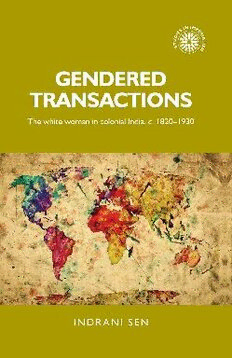
Gendered transactions: The white woman in colonial India, c.1820-1930 PDF
Preview Gendered transactions: The white woman in colonial India, c.1820-1930
General editor: Andrew S. Thompson Founding editor: John M. MacKenzie When the ‘Studies in Imperialism’ series was founded more than twenty-five years ago, emphasis was laid upon the conviction that ‘imperialism as a cultural phenomenon had as significant an effect on the dominant as on the subordinate societies’. With well over a hundred titles now published, this remains the prime concern of the series. Cross-disciplinary work has indeed appeared covering the full spectrum of cultural phenomena, as well as examining aspects of gender and sex, frontiers and law, science and the environment, language and literature, migration and patriotic societies, and much else. Moreover, the series has always wished to present comparative work on European and American imperialism, and particularly welcomes the submission of books in these areas. The fascination with imperialism, in all its aspects, shows no sign of abating, and this series will continue to lead the way in encouraging the widest possible range of studies in the field. ‘Studies in Imperialism’ is fully organic in its development, always seeking to be at the cutting edge, responding to the latest interests of scholars and the needs of this ever-expanding area of scholarship. Gendered transactions SELECTED TITLES AVAILABLE IN THE SERIES WRITING IMPERIAL HISTORIES ed. Andrew S. Thompson EMPIRE OF SCHOLARS Tamson Pietsch HISTORY, HERITAGE AND COLONIALISM Kynan Gentry COUNTRY HOUSES AND THE BRITISH EMPIRE Stephanie Barczewski THE RELIC STATE Pamila Gupta WE ARE NO LONGER IN FRANCE Allison Drew THE SUPPRESSION OF THE ATLANTIC SLAVE TRADE ed. Robert Burroughs and Richard Huzzey HEROIC IMPERIALISTS IN AFRICA Berny Sèbe Gendered transactions the white woman in colonial india, c. 1820–1930 Indrani Sen MANCHESTER UNIVERSITY PRESS Copyright © Indrani Sen 2017 The right of Indrani Sen to be identified as the author of this work has been asserted by her in accordance with the Copyright, Designs and Patents Act 1988. Published by MANCHESTER UNIVERSITY PRESS ALTRINCHAM STREET, MANCHESTER M1 7JA www.manchesteruniversitypress.co.uk British Library Cataloguing-in-Publication Data A catalogue record for this book is available from the British Library Library of Congress Cataloging-in-Publication Data applied for ISBN 978 0 7190 8962 6 hardback First published 2017 The publisher has no responsibility for the persistence or accuracy of URLs for any external or third-party internet websites referred to in this book, and does not guarantee that any content on such websites is, or will remain, accurate or appropriate. Typeset by Servis Filmsetting Ltd, Stockport, Cheshire For Chandan CONTENTS Acknowledgements—ix Introduction 1 Part I The white woman and the ‘civilising mission’ 1 The missionary ‘gaze’ and the ‘civilising mission’: zenana encounters in nineteenth-century Bengal 23 2 Flora Annie Steel, social reform and female education in late nineteenth-century Punjab 53 3 Returning the ‘gaze’: colonial encounters in Indian women’s English writings in late nineteenth-century western India 82 Part II Colonial domesticity, white women’s health and gender disadvantage 4 The ambivalences of power inside the colonial home: memsahibs, ayahs and wet-nurses 113 5 Marginalising the memsahib: the white woman’s health issues in colonial medical writings 144 6 The colonial ‘female malady’: European women’s mental health and addiction in the late nineteenth century 172 Conclusion 204 Select bibliography—208 Index—223 [ vii ] ACKNOWLEDGEMENTS In many ways, this book is the outcome of years of researching and writing on the subject of the white woman in colonial India. However, this particular book was completed in a specifically challenging context of setbacks, heavy teaching schedule and onerous administra- tive responsibilities, which all seemed to come together. It is all the more so that while completing it, I have incurred innumerable debts of goodwill, help and support from friends and well-wishers. My young friends, Manu, Samiksha and Saurabh, former students who are young teachers themselves today, tracked down electronic journals and read earlier drafts of chapters in the midst of their own busy schedules. Without them this book just would not have fructi- fied. To Waltraud, a warm thank you for her encouragement over the years and especially for her support for this book. Thanks to Ranjana for sharing rare research materials, and to Amar, Lata, Menka, Parimala, Partho, Prasun, Shashank and Shilpi for sustaining me with their friendship, help and interest in my work at different stages. The genesis of this book lay in a Research Award Fellowship awarded by the University Grants Commission which gave me the opportunity to research and mull over fresh dimensions of gender and colonial India, besides giving me leave from Sri Venkateswara College, Delhi University. Various fellowships and grants at different junctures over the years cumulatively contributed towards the shaping of this book. They were crucial in enabling me to access primary materials at that amazing repository, the British Library in London. I gratefully acknowledge here a British Academy Visiting Fellowship, a Visiting Fellowship at Oxford Brookes University, travel grants from the Wellcome Trust and the Indian Council of Historical Research, as well as two academic grants from the Charles Wallace India Trust. In addi- tion, I wish to thank the staff of Sri Venkateswara College Library and the Nehru Memorial Museum and Library at New Delhi, the National Library at Kolkata, the University Library, Cambridge University, the School of Oriental and African Studies library, as well as the Wellcome Library at London. At Manchester University Press, I am thankful to the series editors for including this book in their Studies in Imperialism Series. I must also express my gratitude to them and also to the anonymous readers of the manuscript for their constructive suggestions and comments. This book has turned out to be the better for them. I wish to extend [ ix ]
